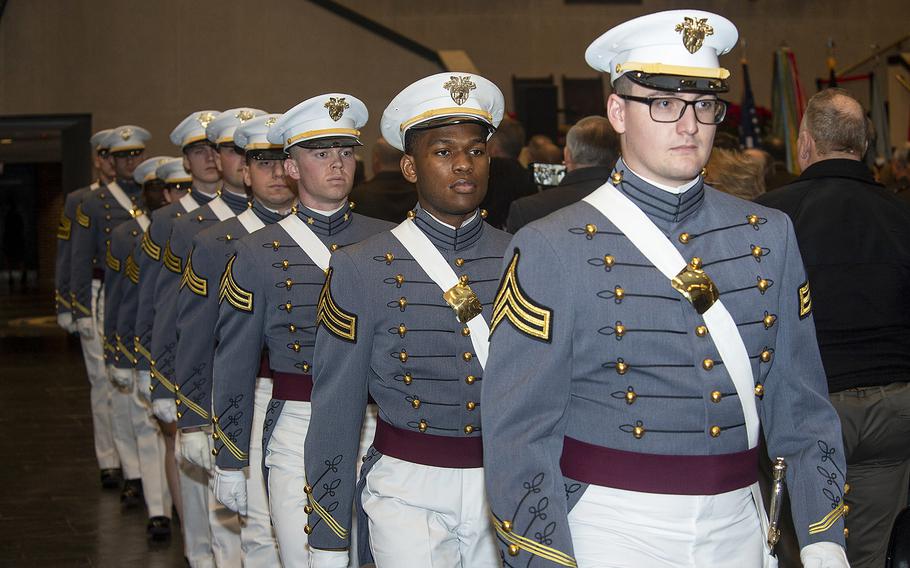
Fourteen members of the U.S. Military Academy Class of 2022 earned their diplomas and graduated Dec. 16, 2022, during a ceremony at the U.S. Military Academy in West Point, N.Y. (Kyle Osterhoudt/U.S. Military Academy)
The man who organized lawsuits that led the Supreme Court to reject race-based affirmative action in college admissions announced a new target Thursday: military service academies.
Edward Blum, president of Students for Fair Admissions, announced the launch of a website called WestPointNotFair that aims to gather information from applicants who were rejected by the U.S. Military Academy, the U.S. Naval Academy and the U.S. Air Force Academy. All three of those military institutions have considered race alongside numerous other factors, including academic credentials and leadership qualities, in their competitive admissions.
“It is the hope of Students for Fair Admissions that the service academies will soon end the use of racial classifications and preferences in their admissions policies,” the organization said in a statement. “Failure to do so may result in polarizing litigation.”
In late June, the Supreme Court ruled that race-conscious admissions programs at Harvard University and the University of North Carolina at Chapel Hill violated equal protection guarantees under the Constitution. The ruling affects colleges and universities across the country and is expected to prevent admissions officers from considering race as a separate factor in their decision-making.
A footnote in the ruling also carved out an apparent exception for the military academies in West Point, N.Y., Annapolis, Md., and Colorado Springs. The ruling, written by Chief Justice John G. Roberts Jr., noted that the Biden administration had argued race-based admissions programs furthered “compelling interests” at the academies.
“No military academy is a party to these cases, however, and none of the courts below addressed the propriety of race-based admissions systems in that context,” the footnote said. “This opinion also does not address the issue, in light of the potentially distinct interests that military academies may present.”
For the academies, which educate and train future military officers, racial diversity is a crucial matter. Military leaders want to ensure, as much as possible, that officers reflect the diversity of the nation and enlisted forces.
Federal education data shows that the share of cadets at West Point who identify with a racial or ethnic minority group rose from 20 percent in 2000 to 36 percent in 2021. There were similar demographic trends at the Naval and Air Force academies.
The Biden administration has argued that diversity within the officer corps is a “critical national security imperative” and that race-conscious admissions is an essential tool for meeting that goal.
How the academies will respond to the court ruling is not yet clear.
“We’re currently assessing the decision and its potential impacts on our practices,” Air Force Academy spokesman Dean J. Miller wrote in an email Thursday.
The Naval Academy’s public affairs office said in a statement: “Historically, race has been one of many non-determinative factors (such as geographic and socio-educational backgrounds, work experience, STEM interest/propensity, etc.) considered when holistically evaluating candidates for appointment consideration.” The statement did not say whether there would be changes in the admissions process.
The media office at West Point did not immediately respond to a request for comment.
Blum’s announcement does not necessarily mean a lawsuit against the academies is imminent. Even if a suit were filed, it would likely take years to work its way through the courts. In previous cases, he has first sought examples of rejected applicants who would have standing to challenge the policy in court. His message Thursday appears to replicate that strategy.
Blum, 71, who is White and lives in Maine, is a longtime opponent of racial preferences.
Looking beyond the service academies, Blum said, the mission of Students for Fair Admissions is shifting.
“Compliance is the next big task here,” he said. “SFFA really will evolve into a watchdog group more than a litigation group. If we find that a university is skirting the ruling, literally going over the bright lines and violating what we think should be the proper admissions processes, then we will sue.”